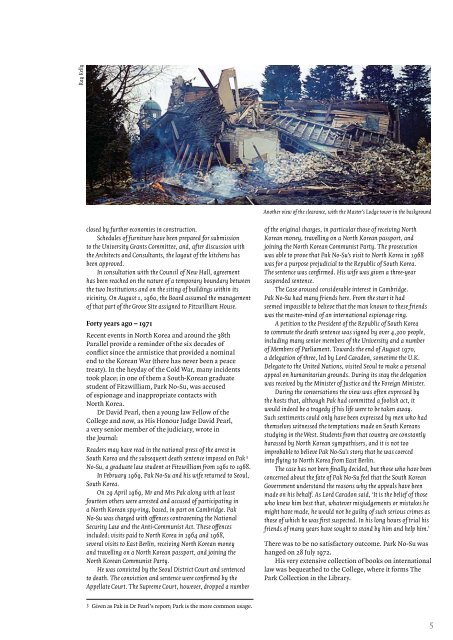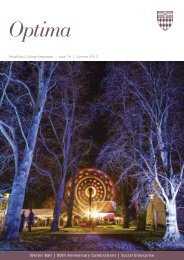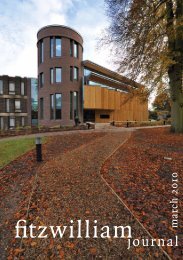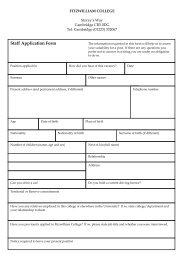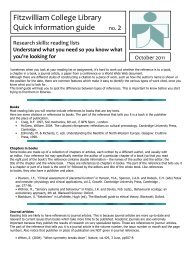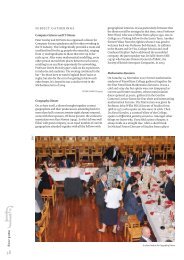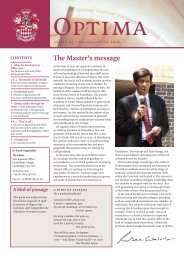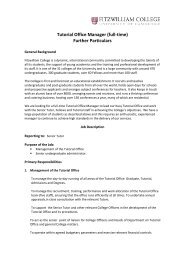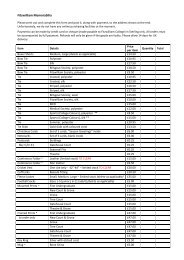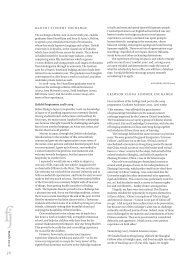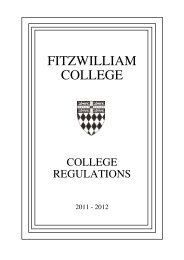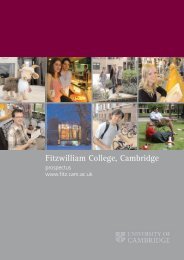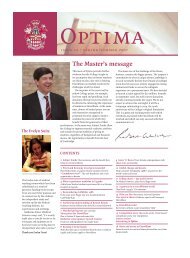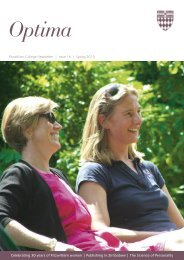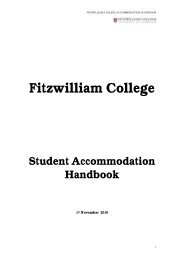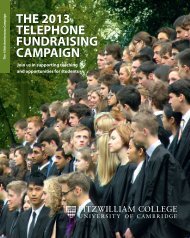Part I - Fitzwilliam College - University of Cambridge
Part I - Fitzwilliam College - University of Cambridge
Part I - Fitzwilliam College - University of Cambridge
Create successful ePaper yourself
Turn your PDF publications into a flip-book with our unique Google optimized e-Paper software.
Ray Kelly<br />
closed by further economies in construction.<br />
Schedules <strong>of</strong> furniture have been prepared for submission<br />
to the <strong>University</strong> Grants Committee, and, after discussion with<br />
the Architects and Consultants, the layout <strong>of</strong> the kitchens has<br />
been approved.<br />
In consultation with the Council <strong>of</strong> New Hall, agreement<br />
has been reached on the nature <strong>of</strong> a temporary boundary between<br />
the two Institutions and on the siting <strong>of</strong> buildings within its<br />
vicinity. On August 1, 1960, the Board assumed the management<br />
<strong>of</strong> that part <strong>of</strong> the Grove Site assigned to <strong>Fitzwilliam</strong> House.<br />
Forty years ago – 1971<br />
Recent events in North Korea and around the 38th<br />
Parallel provide a reminder <strong>of</strong> the six decades <strong>of</strong><br />
conflict since the armistice that provided a nominal<br />
end to the Korean War (there has never been a peace<br />
treaty). In the heyday <strong>of</strong> the Cold War, many incidents<br />
took place; in one <strong>of</strong> them a South-Korean graduate<br />
student <strong>of</strong> <strong>Fitzwilliam</strong>, Park No-Su, was accused<br />
<strong>of</strong> espionage and inappropriate contacts with<br />
North Korea.<br />
Dr David Pearl, then a young law Fellow <strong>of</strong> the<br />
<strong>College</strong> and now, as His Honour Judge David Pearl,<br />
a very senior member <strong>of</strong> the judiciary, wrote in<br />
the Journal:<br />
Readers may have read in the national press <strong>of</strong> the arrest in<br />
South Korea and the subsequent death sentence imposed on Pak 3<br />
No-Su, a graduate law student at <strong>Fitzwilliam</strong> from 1961 to 1968.<br />
In February 1969, Pak No-Su and his wife returned to Seoul,<br />
South Korea.<br />
On 29 April 1969, Mr and Mrs Pak along with at least<br />
fourteen others were arrested and accused <strong>of</strong> participating in<br />
a North Korean spy-ring, based, in part on <strong>Cambridge</strong>. Pak<br />
No-Su was charged with <strong>of</strong>fences contravening the National<br />
Security Law and the Anti-Communist Act. These <strong>of</strong>fences<br />
included: visits paid to North Korea in 1964 and 1968,<br />
several visits to East Berlin, receiving North Korean money<br />
and travelling on a North Korean passport, and joining the<br />
North Korean Communist <strong>Part</strong>y.<br />
He was convicted by the Seoul District Court and sentenced<br />
to death. The conviction and sentence were confirmed by the<br />
Appellate Court. The Supreme Court, however, dropped a number<br />
3 Given as Pak in Dr Pearl’s report; Park is the more common usage.<br />
Another view <strong>of</strong> the clearance, with the Master’s Lodge tower in the background<br />
<strong>of</strong> the original charges, in particular those <strong>of</strong> receiving North<br />
Korean money, travelling on a North Korean passport, and<br />
joining the North Korean Communist <strong>Part</strong>y. The prosecution<br />
was able to prove that Pak No-Su’s visit to North Korea in 1968<br />
was for a purpose prejudicial to the Republic <strong>of</strong> South Korea.<br />
The sentence was confirmed. His wife was given a three-year<br />
suspended sentence.<br />
The Case aroused considerable interest in <strong>Cambridge</strong>.<br />
Pak No-Su had many friends here. From the start it had<br />
seemed impossible to believe that the man known to these friends<br />
was the master-mind <strong>of</strong> an international espionage ring.<br />
A petition to the President <strong>of</strong> the Republic <strong>of</strong> South Korea<br />
to commute the death sentence was signed by over 4,300 people,<br />
including many senior members <strong>of</strong> the <strong>University</strong> and a number<br />
<strong>of</strong> Members <strong>of</strong> Parliament. Towards the end <strong>of</strong> August 1970,<br />
a delegation <strong>of</strong> three, led by Lord Caradon, sometime the U.K.<br />
Delegate to the United Nations, visited Seoul to make a personal<br />
appeal on humanitarian grounds. During its stay the delegation<br />
was received by the Minister <strong>of</strong> Justice and the Foreign Minister.<br />
During the conversations the view was <strong>of</strong>ten expressed by<br />
the hosts that, although Pak had committed a foolish act, it<br />
would indeed be a tragedy if his life were to be taken away.<br />
Such sentiments could only have been expressed by men who had<br />
themselves witnessed the temptations made on South Koreans<br />
studying in the West. Students from that country are constantly<br />
harassed by North Korean sympathisers, and it is not too<br />
improbable to believe Pak No-Su’s story that he was coerced<br />
into flying to North Korea from East Berlin.<br />
The case has not been finally decided, but those who have been<br />
concerned about the fate <strong>of</strong> Pak No-Su feel that the South Korean<br />
Government understand the reasons why the appeals have been<br />
made on his behalf. As Lord Caradon said, ‘It is the belief <strong>of</strong> those<br />
who knew him best that, whatever misjudgements or mistakes he<br />
might have made, he would not be guilty <strong>of</strong> such serious crimes as<br />
those <strong>of</strong> which he was first suspected. In his long hours <strong>of</strong> trial his<br />
friends <strong>of</strong> many years have sought to stand by him and help him.’<br />
There was to be no satisfactory outcome. Park No-Su was<br />
hanged on 28 July 1972.<br />
His very extensive collection <strong>of</strong> books on international<br />
law was bequeathed to the <strong>College</strong>, where it forms The<br />
Park Collection in the Library.<br />
5


